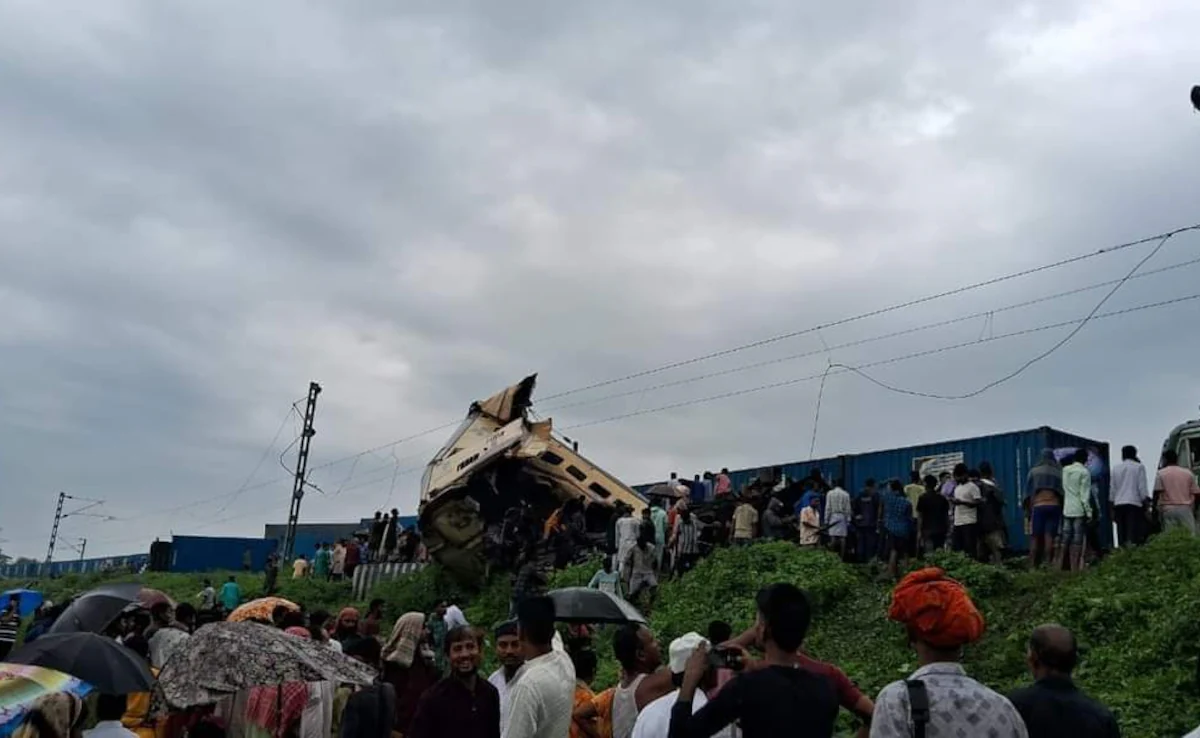New Delhi, June 17, 2024 – The death toll in the tragic collision between the Kanchanjunga Express and a goods train in West Bengal’s Darjeeling district has risen to 15. The collision, which took place near Rangapani station, about 30 km from New Jalpaiguri, has also left several others injured. This incident has severely disrupted train movement along the Chicken’s Neck corridor, a vital link connecting Northeast India with the rest of the country.
Detailed Account of the Incident
- Time and Location: The accident occurred on Monday morning when the Sealdah-bound Kanchanjunga Express, traveling from Agartala, was struck from behind by a goods train.
- Impact of the Collision: The rear three coaches of the express train derailed due to the collision, leading to significant casualties and injuries. Approximately 20-25 passengers were impacted by the derailment.
- Casualties: Among the deceased are the pilot and co-pilot of the goods train. Injured passengers have been rushed to the North Bengal Medical College and Hospital for immediate medical attention.
Official Responses and Rescue Operations
Prime Minister Narendra Modi expressed his condolences to the families of the deceased and emphasized the government’s commitment to providing all necessary assistance. He stated, “The railway accident in West Bengal is saddening. Condolences to those who lost their loved ones. I pray that the injured recover at the earliest.” PM Modi also mentioned that Railway Minister Ashwini Vaishnaw was on his way to the accident site to oversee the rescue operations.
Railway Minister Ashwini Vaishnaw, who is personally overseeing the rescue efforts, announced an ex-gratia of ₹10 lakh for the families of the deceased, ₹2.5 lakh for those grievously injured, and ₹50,000 for those with minor injuries. Vaishnaw reiterated the importance of implementing advanced safety systems like ‘Kavach’ to prevent such tragedies in the future.
The Role of ‘Kavach’ in Railway Safety
What is ‘Kavach’?
‘Kavach’ is an Automatic Train Protection (ATP) system developed indigenously by the Research Design and Standards Organisation (RDSO) in collaboration with Indian industry. It includes several critical features:
- Automatic Speed Regulation: It can automatically apply brakes if the train driver fails to do so.
- Collision Prevention: Alerts and halts the train if another train is detected on the same track.
- Weather Resilience: Supports operations in adverse weather conditions like dense fog.
- Safety Certification: Holds a Safety Integrity Level 4 (SIL-4) certification, indicating a very low probability of failure (once in 10,000 years).
Despite its advanced features, the ‘Kavach’ system was not installed on the Kanchanjunga Express, which could have potentially prevented the accident. The system is scheduled to be installed on the Delhi-Howrah route, which covers parts of West Bengal, later this year.
Historical Context: Major Train Accidents in India
The Kanchanjunga Express accident adds to a grim list of deadly train accidents in India over the past decades. Here are some significant incidents:
- 2023: The Coromandel Express collided with a goods train in Odisha’s Balasore district after hitting the Bengaluru-Howrah Superfast Express. This tragic triple-train crash resulted in over 300 deaths and more than 1,000 injuries.
- 2018: Around 60 people were killed and 77 others injured after a train ran over Dussehra revellers near Amritsar, Punjab. The train was coming from Jalandhar when the accident happened at Joda Phatak.
- 2018: In Uttar Pradesh’s Kushinagar, a school van was hit by a train at a railway crossing, resulting in the deaths of 14 people, including 13 children.
- 2017: The Jagdalpur-Bhubaneswar Express derailed near Kuneru station in Andhra Pradesh, killing 41 people.
- 2016: The Indore-Patna Express derailed near Kanpur, Uttar Pradesh, leading to 146 deaths. The accident was caused by carriages crashing into each other.
- 2010: The Jnaneswari Express derailed and collided with a freight train near Kolkata, resulting in 146 deaths and over 200 injuries. Authorities attributed this incident to track sabotage by Maoist insurgents.
- 2002: The Rajdhani Express derailed and plunged into the Dhaba river, claiming over 120 lives amidst allegations of sabotage.
- 2006: The Mumbai train bombings orchestrated by Islamist militants resulted in 186 deaths and 700 injuries.
- 1999: The collision in Gaisal claimed 285 lives.
- 1998: The Sealdah Express collided with a derailed train in dense fog, resulting in over 210 deaths.
- 1981: The Bihar bridge collapse led to over 800 fatalities when a train fell into the river below.
- 1956: The Marudyar river plunge resulted in 154 fatalities.
These accidents underscore the recurring vulnerabilities in India’s railway infrastructure and the critical need for comprehensive safety protocols and technological advancements.
Helpline Numbers
For those seeking information regarding the Kanchanjunga Express accident, the Railways have released the following helpline numbers:
- Sealdah: 033-23508794, 033-23833326
- Guwahati: 0361-2731621, 0361-2731622, 0361-2731623
For more detailed updates on the Kanchanjunga Express accident and other related news, stay tuned to Paperdabba.









